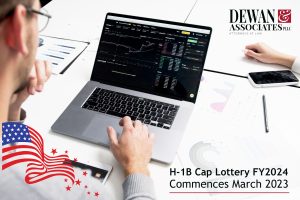Dear clients and friends,
We wanted to update you on an important change to the public charge rule, which will have an impact on those who are filing the Form I-485 Applications to Register the Permanent Resident or the Adjust Status on or after December 23, 2022, with a few exceptions.
Background:
· The “public charge” concept has been around since 1999 when the Congress made it a matter of law for a noncitizen’s application for a visa, admission, or adjustment of status to be denied if the applicant is “likely at any time to become a public charge” on the United States government.
· The 1999 Interim Field Guidance, published by the former Immigration and Naturalization Service (INS) (now USCIS), defines “public charge” as someone who is “primarily dependent on the Government for subsistence, as demonstrated by either the receipt of public cash assistance for income maintenance or institutionalization for long-term care at the Government’s expense.”
· The Biden Administration has announced that a new version of Form I-485 (Application for Adjustment of Status) will be required for all green card applications starting on December 23, 2022. This new version includes a new public charge portion and several additional questions. The new public charge rule, published by the Department of Homeland Security (DHS) on September 8, 2022, determines whether green card applicants are inadmissible to the U.S. based on their likelihood to become a public charge.
· The new Form I-485 will capture some of the information previously collected under the Trump administration with the discontinued Form I-944.
Changes under Biden’s Public Charge Rule:
· Greater emphasis has been placed on the following statutory factors:
· Financial Status: Consideration of the applicant’s debts. When considering the applicant’s financial status, one of the factors that USCIS will consider is the household’s assets and resources, as well as the household’s liabilities or debts. These include both secured and unsecured debts, such as loans (student loans, vehicle loans, home loans etc.), alimony, and child support payments.
· Education: USCIS will also consider the noncitizen’s education and skills in a public charge inadmissibility determination. While some noncitizens may establish their education and skills through evidence of completed degrees, the statutory education and skills factor does not specify that only formal education is acceptable. USCIS may consider other evidence of attained knowledge and skills, including those skills earned through certifications and licensure, as well as skills obtained through on-the-job training or overall work experience.
· Totality of the Circumstances Test: When evaluating whether a green card applicant is likely at any time to become a public charge, USCIS conducts a “totality of the circumstances” test, meaning that the immigration officer will evaluate all the information provided on the Application to Register Permanent Residence or Adjust Status (Form I-485), Report of Medical Examination and Vaccination Record (Form I-693), any other forms and evidences contained in the records, as well as statements made by an applicant during an interview, if applicable.
This means that the immigration officers will take into account all the information provided in the application, including any forms, evidence, and statements made during an interview, if applicable. It is important to note that there is no “bright-line” test for determining if an applicant is likely to become a public charge, and no one factor can be the sole criterion for determining inadmissibility.
Biden’s public charge rule essentially reinstates the 1999 Interim Field Guidance that was in place before President Trump’s overhaul of the public charge rule during his presidential term. In general, this public charge rule removes barriers to immigration, as most immigrants will not be found to be inadmissible based on public charge grounds.
We understand that this change may be confusing and stressful. We want to assure you that our team is well-versed in the new public charge rule and is here to assist you through the process. If you have any questions or concerns, please do not hesitate to reach out to us.
Yours,
Dewan & Associates PLLC.
New York Offic




